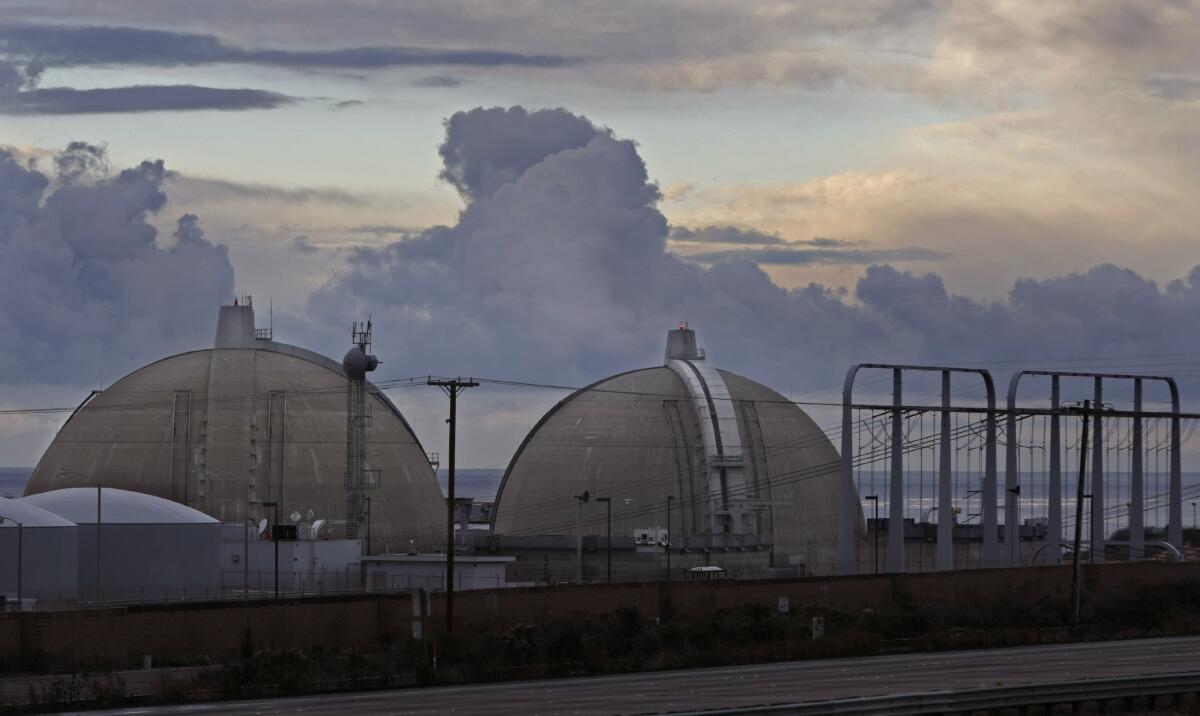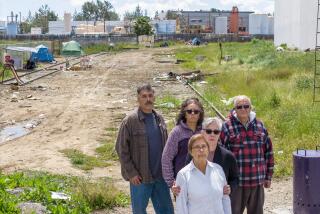Federal regulator dismisses nuclear plant complaint against Edison

The twin domes of the San Onofre nuclear plant sit on the coast south of San Clemente. The plant permanently closed in 2013 because of design flaws with replacement steam generators.
Federal regulators dismissed a complaint against Southern California Edison that accused the utility of failing to seek approval for changes to the San Onofre nuclear power plant that ultimately led to the facility’s permanent closure.
In a July 28 letter, the Nuclear Regulatory Commission said that because the plant is no longer in operation, the complaint filed by the environmental group Friends of the Earth does not need further consideration.
Friends of the Earth had claimed that Edison failed to request a license amendment for changes to the new but faulty steam generators. A small radiation leak in one of the steam generators led the utility to shut down the facility in January 2012. The facility was permanently closed a year and a half later.
San Onofre has “permanently ceased operations and the licensee has permanently removed fuel from the reactor vessels,” wrote William Dean, director of the commission’s Office of Nuclear Reactor Regulation. “As such, there is no longer a potential for the [San Onofre] Units 2 and 3 steam generators to be operated, and the petitioner’s request for the NRC to order the licensee to submit a license amendment application . . . is moot.”
Southern California Edison praised the decision, stating in a news release Friday that federal regulators already had determined in 2012 that the changes to the new steam generators did not require a license amendment.
“SCE is focused on safely decommissioning San Onofre,” the utility stated.
The commission decision this week likely ends the federal regulator’s look at what went wrong at San Onofre and what, if anything, Edison contributed to the troubles that led to the nuclear plant’s closure.
“What this means is the perpetrator got off the hook,” said Arnie Gundersen, a nuclear engineer who served as the lead witness in the complaint against Edison. “The bad behavior that got them in this mess is not being punished but is being supported.”
The decision comes at a time when Edison is in arbitration for financial compensation of $7.6 billion from Mitsubishi Heavy Industries, the contractor involved in the changes to the nuclear plant.
Edison alleges that Mitsubishi manufactured “a lemon” and could not fix “defects in its product because they were so fundamental and pervasive.”
Mitsubishi does not dispute that the generators failed after being installed as part of a repowering project designed to prolong the life of a facility that provided electricity for more than 1.4 million homes in Southern California.
How the dispute is resolved could help determine whether customers of Edison and San Diego Gas & Electric, which jointly own the nuclear plant, remain on the hook for costs related San Onofre’s closure.
As it stands, ratepayers face costs of $3.3 billion toward the plant’s closure, but that could be offset with compensation from Mitsubishi. Whatever Edison can collect from the contractor will be divided 50-50 between the utilities and their customers.
Mitsubishi argues that the contract with Edison limits its liability to just $137 million.
At issue is a decision by Edison to replace the old steam generators at San Onofre in 2010 and 2011 with units that turned out to be faulty. One of the new units leaked small amounts of radiation that forced the shutdown of the facility.
Friends of the Earth argued that Edison should have sought to amend its nuclear operating license for the design changes that ultimately caused problems with the steam generators and led to the radiation leak. The review during the license amendment, the group argues, might have identified the change as a problem.
In addition to compensation from Mitsubishi, Edison is seeking money from the plant’s insurer, Nuclear Electric Insurance Ltd. The utilities are seeking $433 million from NEIL, including $339 million for Edison.
Edison said all funds recovered from NEIL will go to the benefit of customers.
Follow Ivan Penn on Twitter at @ivanlpenn
More to Read
Inside the business of entertainment
The Wide Shot brings you news, analysis and insights on everything from streaming wars to production — and what it all means for the future.
You may occasionally receive promotional content from the Los Angeles Times.











